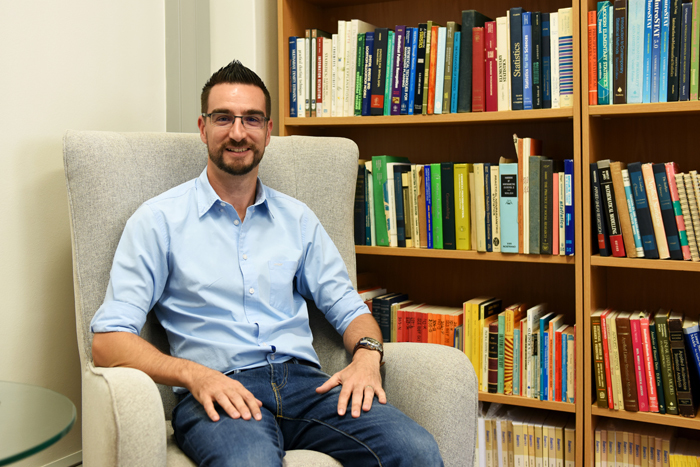Number's up for scary statistics
27 March 2017 | Story Kate-Lyn Moore. Photo Robyn Walker.
Senior lecturer Dr Miguel Lacerda teaches statistics with an artful combination of precision and creativity.
Based in the Department of Statistical Sciences, Lacerda does his utmost to bring his complex and often abstract course content to life. And he has exceeded all expectations, if the course feedback is anything to go by.
It is precisely for this reason that Lacerda has been honoured with a 2016 Distinguished Teacher Award. Lacerda spoke to Kate-Lyn Moore from the UCT newsroom.
What do you believe makes a good teacher?
Outside of academia, the term lecture is commonly used to refer to a speech; typically one that is scripted and does not solicit input from the audience. This is very different from what we are called to do as academic lecturers.
To deliver a good lecture, we must understand our audience intimately. I find that contemplating the following points before a lecture helps me to relate better to my audience:
- What academic knowledge can I assume to be known? Even if it was covered previously, is it worth recapping before building on it?
- How can I communicate this topic in such a way that it is accessible to students with different learning styles? Can I find real-world examples that the students can identify with?
- Do I need to clarify the intended meaning of a word/phrase in this context, particularly for those students for which English is not a home language?
The above points allude to an audience that is diverse in terms of academic ability, learning style and cultural background. This diversity must inform our approach to teaching.
How did you come to be a lecturer in UCT's Department of Statistical Sciences?
I completed my BBusSc degree specialising in quantitative management in 2005 and my MSc in statistical sciences in 2008, both at UCT. I began lecturing in 2007 while completing my master's.
The first class I taught was the summer term version of our first-year applied statistics course. I remember arriving nervously for my first lecture on 3 January 2007, not knowing how to set up a projector or operate a microphone, and no one else around to help me get going! That was quite an experience!
How would you describe your teaching style?
The material that I teach is largely abstract and technical in nature. My chief objective is to communicate this content in a manner that makes it accessible and meaningful to my heterogeneous audience.
While I am passionate about the content, I can understand why students might find chapters upon chapters of confusing symbols and formulae somewhat daunting. It is my job to bring this material to life and to instil an appreciation for it in my students. After all, a genuine interest in a subject is a strong motivation for learning. While it is a requirement that students be able to derive the results covered in class on their own, I strongly discourage rote learning.
Instead, I believe that students should be able to arrive at a result through sound reasoning, rather than by having memorised the process of getting there. Students should also understand the relevance of theoretical results in an applied context through applications to unseen problems.
What do you love most about teaching?
I love thinking about creative ways to explain complex concepts to students. I love it even more when it works!
What is the importance of this kind of recognition?
I am truly honoured to receive this award. I put a lot of effort into my teaching, and it is great to have it recognised in this way.
What do your academic responsibilities entail besides research?
I am keenly involved in promoting statistics as an exciting career option. For many years, statistics has been viewed as a service discipline and the fall-back option for students who fail actuarial science.
However, the demand for data-savvy professionals is growing exponentially as huge volumes of complex data are accumulated in diverse fields ranging from astronomy and bioinformatics to finance and marketing. Statistics is now an attractive career path in its own right.
I aim to leverage this momentum to attract good students to study statistics and data science at UCT. This has required the development of new courses and degree programmes, and a careful re-evaluation of our existing offerings. I have been a key player in the curriculum development for these programmes.
What do you like doing off duty?
I enjoy spending time with my wife and baby boy, watching TV series, running and reading. And eating good food – my wife and I are avid foodies!
2016's Distinguished Teachers:
David Erwin | Ryan Kruger | Miguel Lacerda | Janice McMillan | Jonathan Shock | Jimmy Winfield
 This work is licensed under a Creative Commons Attribution-NoDerivatives 4.0 International License.
This work is licensed under a Creative Commons Attribution-NoDerivatives 4.0 International License.
Please view the republishing articles page for more information.










